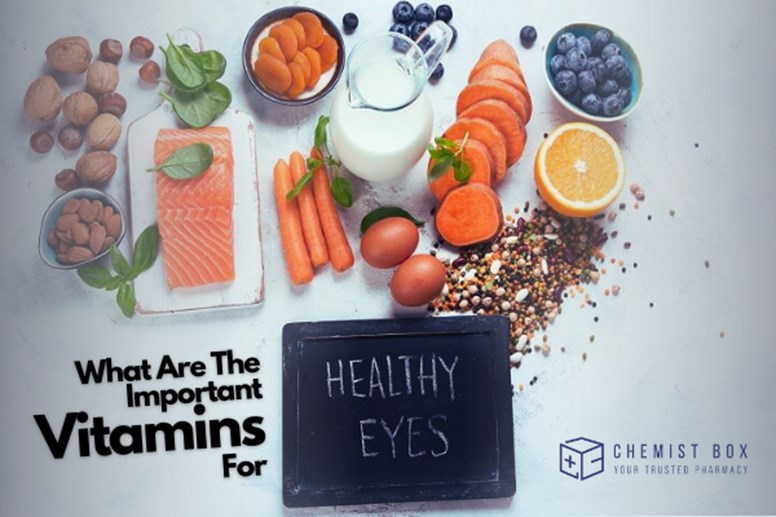
Healthy Greeting To our Readers!
The Eyes are one of the five sense organs of the human body and one of the complex organs also that need a proper diet, including essential vitamins and minerals for them to remain healthy for long. Not only proper diet but your eyes do need proper rest and exercise to stay healthy!
Common conditions, such as diabetic retinopathy, age-related macular degeneration (AMD), glaucoma, and cataracts, can impact your eyes. Though a variety of different factors causes these conditions, nutrition seems to influence all of them, at least in part.
Through this article, we are discussing all the essential vitamins and minerals a human must include in their diet to achieve healthy eyesight.
Here are 9 key vitamins and nutrients that help maintain eye health!!
Vitamin A
Vitamin A plays a crucial role in vision by maintaining a clear cornea, which is the outside covering of your eye. This vitamin is also a component of rhodopsin, a protein in your eyes that allows you to see in low light conditions.
Vitamin A may also help protect against some eye afflictions. Some studies suggest that diets high in vitamin A may be associated with a reduced risk of cataracts and age-related macular degeneration.
For general eye health, vitamin-A-rich foods are recommended over supplements. Sweet potatoes are an excellent source, as are leafy green vegetables, pumpkins, and bell peppers.
Vitamin E
Many eye conditions are believed to be associated with oxidative stress, which is an imbalance between antioxidants and free radicals in your body.
Vitamin E is a potent antioxidant that helps protect your cells including your eye cells from damage by harmful free radicals unstable molecules.
Some studies suggest that diets high in vitamin E may help prevent age-related cataracts. However, more research is needed as some studies show no association between vitamin E and this condition
Nonetheless, a diet that includes adequate vitamin E is recommended to maintain proper eye health. Some vitamin-E-rich options include nuts, seeds, and cooking oils. Salmon, avocado, and leafy green vegetables are also good sources.
Vitamin C
Like vitamin E, vitamin C is a powerful antioxidant that may protect your eyes against damaging free radicals. Vitamin C and several other nutrients are used in the supplement AREDS, which may benefit those with AMD. When taken daily, one study suggests that AREDS may reduce the risk of this condition progressing by 25%.
In addition, vitamin C is required to make collagen, a protein that provides structure to your eye, particularly in the cornea and sclera. Several observational studies suggest that vitamin C may help lower your risk of developing cataracts, a condition that causes your eye to become cloudy and impairs vision.
Citrus and tropical fruits, bell peppers, broccoli, and kale contain particularly high amounts of vitamin C, making them great options to boost your daily intake.
Vitamins B6, B9, and B12
Researchers have also studied several B vitamins for their impact on eye health, particularly vitamins B6, B9, and B12. This combination of vitamins can lower levels of homocysteine, a protein in your body that may be associated with inflammation and an increased risk of developing AMD.
Riboflavin
Another B vitamin studied for eye health is riboflavin (vitamin B2). As an antioxidant, riboflavin has the potential to reduce oxidative stress in your body, including your eyes.
In particular, scientists are studying riboflavin’s potential to prevent cataracts, as prolonged riboflavin deficiency may lead to this condition. Interestingly, many individuals with cataracts also are deficient in this antioxidant.
Niacin
The main function of niacin (vitamin B3) in your body is to help convert food into energy. It can also act as an antioxidant. Recently, studies have suggested that niacin may play a role in the prevention of glaucoma, a condition in which the optic nerve of your eye becomes damaged.
Supplements should be used with caution. When consumed in high amounts of 1.5–5 grams per day, niacin may pose adverse effects to the eyes, including blurred vision, macular damage, and inflammation of the cornea.
However, no evidence consuming foods naturally high in niacin has any adverse effects. Some food sources include beef, poultry, fish, mushrooms, peanuts, and legumes.
Lutein and Zeaxanthin
Lutein and zeaxanthin are part of the carotenoid family, a group of beneficial compounds synthesized by plants. Both of these carotenoids can be found in the macula and retina of your eyes, where they help filter potentially harmful blue light, thus protecting your eyes from damage.
Several studies suggest that these plant compounds may prevent cataracts and prevent or slow the progression of AMD.
Recommended daily intakes and safe supplemental doses have not been established for these compounds. However, up to 20 mg of lutein per day for 6 months has been used in studies without adverse effects.
Omega-3 Fatty Acids
Omega-3 fatty acids are a type of polyunsaturated fat. The cell membranes of your retina contain a high concentration of DHA, a particular type of omega-3.
Besides helping form the cells of your eye, omega-3 fats have anti-inflammatory properties which may play a role in the prevention of diabetic retinopathy (DR).
Omega-3 fats may also benefit individuals with dry eye disease by helping them produce more tears. With this condition, a lack of tears causes dryness, discomfort, and occasional blurry vision.
Stay Informed! Stay Healthy! Stay Happy!
Thank You!
______________________________________________________________________________
Disclaimer: The information included on this site is for educational purposes only and is not intended to be a substitute for medical treatment by a health care professional. Readers are advised to consult their physician to determine the suitability of the information for the reader’s situation!
Chemist Box is an online pharmacy nearby you in Patna. We offer online medicine home delivery in Patna. Call-06126604555 or WhatsApp-06299924338 to order medicines online.
_____________________________________________________________________________________
0 Items ₹ 0
| Product Name | Unit Price | Qty | Subtotal |
|---|